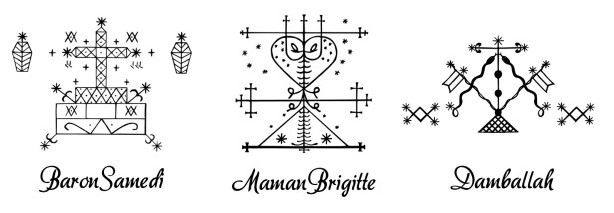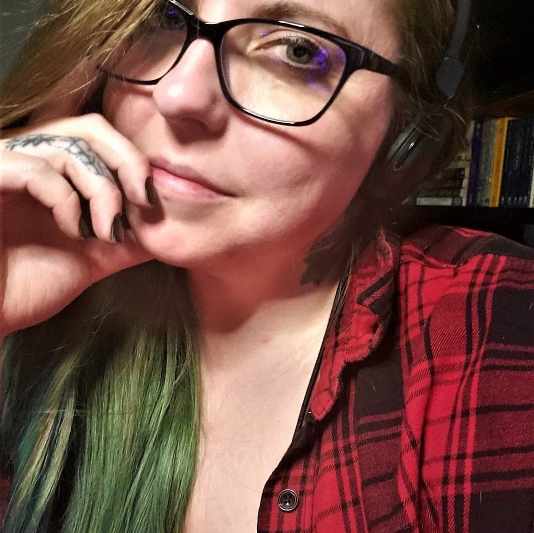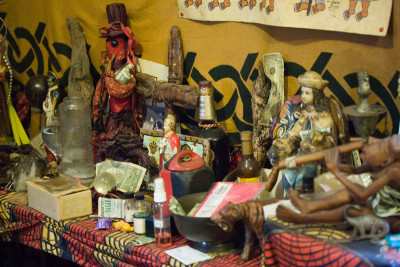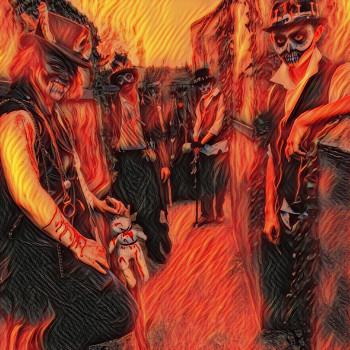Voodoo in New Orleans is quite distinguishable from the practice in other parts of the world, it grew to be more inclusive of the spiritualism that sprang up within the nineteenth century. Within the voodoo religion, powerful spirits called loa—also called mystères, or the invisibles—unlike saints and angels that are housed within the Judeo-Christian religions, they are not prayed to, they are served. Contrary to popular belief, the loa are not deities. They are considered spiritual guides, who communicate with the one supreme creator, Bondye, in order to manifest the petitions for family, love, money, happiness, wealth, and of course revenge. The loa preside over daily life, since Bondye doesn’t interfere with personal matters, and depending upon way in which they are called upon, the spirits can be sympathetic or impish.
The Role of Deceased Ancestors
Within the voodoo religion, it’s a common belief that those who have passed away remain on the earthly plane—this is because it is the responsibility of the living to care for their passed loved ones to help them shed the baggage of their life and get them closer to Bondye. In order to care for ancestors, vodouisants light a candle and leave offerings of food and drink—as thanks, ancestors bless their loved ones with health, wealth, and fortune.
The Loa: Contacting the Spirits
Conducting voodoo rituals don’t always require a practitioner to petition the loa, but it’s more frequent for them to be a part of the ritual than not. Contacting the spirits can be achieved through dance, music, singing, and the use of snakes—a symbol of Papa Legba, who is the conduit to contacting the rest. In organized practice, there are houngans (priests) and mambos (priestesses), as well as bokors (sorcerers) and caplatas (witches) who lead the rituals, take requests, and receive offerings. These ritualists act as hosts to the possessing loa, which can be quite a violent sight, where the participant thrash and shake, then fall to the ground. Being a host to a loa requires those around to know how to sufficiently provide for the spirit, as they can become stubborn and demand more.
Vèvè: Symbolic Representations of the Loa
A vèvè is a religious symbol which serves to represent a loa during ritualistic practice, whereupon sacrifices and offerings are placed. Every loa has their own individual vèvè, which is typically drawn on the floor using a powder—the type of powder used depended on the type of ritual being performed.
Main Loa of the Voodoo Religion
The loa are a diverse group of spirits, too many to name without going too in depth, but these are a couple of the most well-known of the bunch.
Papa Legba: The Spirit of the Crossroads
Among one of the most important spirits within voodoo, in order for there to be any ritual regarding any other loa, Papa Legba must be contacted first. As the spirit of the crossroads, he is the origin of life, the old man who guards the crossroads, the contact between the realms of life and death—Legba must give his permission in order to communicate any other loa.

The poor soul who happens to offend Papa Legba will be virtually deprived of the protection of the spirit world. Guardian of voodoo temples, courtyards, plantations, and crossroads, he also protects the home—if a practitioner is planning on going traveling, they pray to Legba for protection and petition him to safely return them home. A small, crooked old man with a broken body covered in sores, he insists on walking barefoot so he has continuous contact with the earth below him—Legba is a polite and caring spirit, one that all practitioners consider to be lovable.
Papa Ghede and Baron Samedi
Papa Ghede, despite being the spirit of death, is not as forbidding as he may appear in popular imagery—he is dressed in black, with a top hat, with a cigar in his mouth, and controls the souls of those who have passed on. Although the other loa fear and avoid him, he is the one people petition when children are poor of health, as he very much loves children.

There is conflicting information about the relationship between Papa Ghede and Baron Samedi—where some sources claim they are one in the same, where Papa Ghede is the lighter aspect concerning life and Baron Samedi is the dark aspect concerning death. Other sources speak of them being separate entities, where Papa Ghede does the bidding of Baron Samedi. When it comes to magic that deals with death, you can be sure whose power is actually behind it, especially since he has a special interest in those who meet their death as a result of magic.

Georgia-based author and artist, Mary has been a horror aficionado since the mid-2000s. Originally a hobby artist and writer, she found her niche in the horror industry in late 2019 and hasn’t looked back since. Mary’s evolution into a horror expert allowed her to express herself truly for the first time in her life. Now, she prides herself on indulging in the stuff of nightmares.
Mary also moonlights as a content creator across multiple social media platforms—breaking down horror tropes on YouTube, as well as playing horror games and broadcasting live digital art sessions on Twitch.



